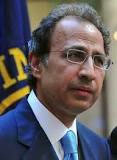Staff Reporter
Islamabad
Adviser to the Prime Minister on Finance and Revenue Dr Abdul Hafeez Shaikh on Monday said the government had restored macroeconomic stability in the country and a current account and primary balance surplus for the first time in many years as well as country’s booming stock market, stabilised exchange rate and a renewed interest from international community in Pakistani market were clear signs of the recovery the economy had staged in recent months.
Addressing the inaugural session of ‘Pakistan Innovative Finance Forum’, arranged by the Asian Development Bank with local partners at a local hotel, Dr Abdul Hafeez Shaikh told the participants that the government had to do over the last few months a lot of things to try and restore macroeconomic stability due to a very difficult economic situation it inherited.
He said tough decisions had to be taken and after a series of steps including partnering with international bilateral and multilateral institutions, cutting down government expenditure, restoring fiscal discipline, incentivising exporters and narrowing the historically high current account deficit, the government was now in a situation where in the last four months of the ongoing fiscal year, the restoration of macroeconomic stability was becoming visible.
The Adviser pointed out that it was for the first time in many years that the country had a current account surplus as well as a surplus primary balance on the fiscal side.
He also referred to Pakistan’s stock market being rated amongst the best performing in the world and the stabilised exchange rate which was allowed to be determined by market forces through a bold decision by the government, was allowing the people to take longer-term decisions needed for development. “We have a renewed interest from international community in the Pakistan market and in the last four months, investment in the Pakistani bonds from outside investors has touched US $ 1 billion while foreign direct investment in the same period has also increased by more than 200 per cent compared to the corresponding period last year,” he added.
Dr. Abdul Hafeez Shaikh said that he was not trying to paint a rosy picture as there were still challenges to tackle particularly in terms of bringing down prices and coming up to people’s expectations for generating more jobs for them and achieving high growth rate. “But the good news is that the growth rate agreed with the IMF is going to be surpassed by a vast margin and similarly, the IMF review of the first quarter concluded recently shows that that all the agreed targets have been surpassed with comfortable margins,” he said.
The adviser said that the government was committed to fiscal discipline, the role of private sector, transparency in governance, tracking down on corruption, reaching out to international community both the multilateral agencies as well as international and domestic private sector. “We have now created a platform on which to build and correct some of the deficiencies of our past and transform our economy,” he said.
He agreed that bringing foreign investment to Pakistan and promotion of our exports were two key areas which had been neglected in the past but the current government was attaching priority to both these sectors by financing businesses through additional Rs 300 billion loans as well as subsidy on electricity and gas and not taxing exports and these measures were resulting in enhanced exports as seen during the last four months. He said the government was also encouraging the private sector and a full-fledged privatisation programme.
The Adviser also cited the 16 per cent growth in revenue collection which had been 20 per cent if the import compression factor had been accounted for, in the last four months as another area where the government had done well. He said the non-tax revenue realised in the last four months had also doubled as compared to the same period last year.
He underscored the building and strengthening of institutions as a priority area for the government and the power and institutional autonomy granted to institutions such as the State Bank of Pakistan and FBR in their day-to-day decision making was an evidence of the government approach to let these institutions work with independence and through top professionals brought from the private sector. “We have done the same to other institutions such as SECP, PTA, NEPRA and OGRA as we do not want to encourage conflict of interest in the way the government and these regulatory institutions work together,” he said.
Dr Abdul Hafeez Shaikh also referred to the government’s efforts to improve the performance of businesses by facilitating them and improving the business procedures and processes and the recent recognition by the World Bank of these efforts was an indication of the sincerity and approach of the government towards boosting business climate in the country. He said the government had also done away with the need for bringing projects of up to Rs 10 billion value to ECNEC and the same could now be processed and approached at the level of ministries and other forums.
He said there were other areas such as financial inclusion and debt management to work and progress was being made in those areas as well. He said the government needed more funds to invest in the infrastructure development as per the ADB estimates which recommended at least 8 per cent of GDP for the next 10 years on infrastructure development in Pakistan. “We are blessed to have people in Pakistan and in the private sector who are resource-rich, determined, eager and curious to find solutions and together we can work to achieve the development goals as we moved ahead,” he added.










